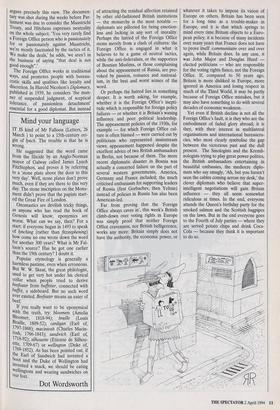Mind your language
IT IS kind of Mr Falloon (Letters, 26 March ) to point to a 15th-century ori- gin of lynch. The trouble is that he is wrong.
He suggested that the word came from the filicide by an Anglo-Norman mayor of Galway called James Lynch FitzStephen, and proves it by referring to a 'stone plate above the door to this very day'. Well, stone plates don't prove much, even if they are there to this very day. The stone inscription on the Monu- ment didn't prove that the papists start- ed the Great Fire of London.
Onomastics are devilish tricky things, as anyone who has read the book of Genesis will know; eponymics are worse. What can we say, then? For a start: if everyone began in 1493 to speak of lynching (rather than fitzstephening) how come no one wrote down the word for another 300 years? What is Mr Fal- loon's source? Has he got one earlier than the 19th century? I doubt it. Popular etymology is generally a harmless pastime, even when erroneous. But W. W. Skeat, the great philologist, used to get very hot under his clerical collar when people tried to derive beefeater from buffetier, connected with buffet, a sideboard. But no such word ever existed. Beefeater means an eater of beef.
If you really want to be eponymical With the truth, try: bloomers (Amelia Bloomer, 1818-94); braille (Louis Braille, 1809-52); cardigan (Earl of, 1797-1868); macintosh (Charles Macin- tosh, 1766-1843); sandwich (Earl of, 1718-92); silhouette (Etienne de Silhou- ette, 1709-67) or wellington (Duke of, 1769-1852). As has been pointed out, if the Earl of Sandwich had invented a boot and the Duke of Wellington had invented a snack, we should be eating wellingtons and wearing sandwiches on our feet.
Dot Wordsworth


























































 Previous page
Previous page